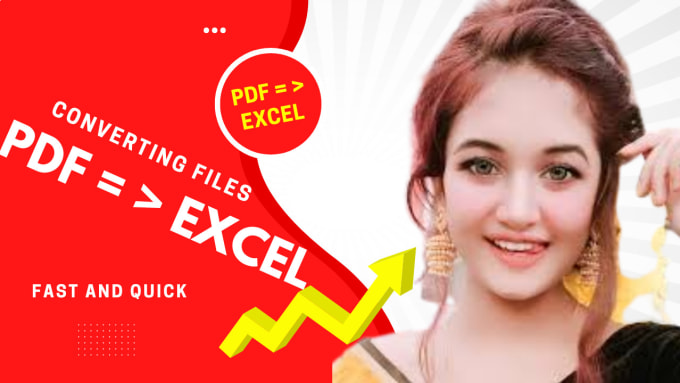5 Easy Steps to Convert PDF to Excel

Converting PDF files to Excel spreadsheets is a common task for professionals and students alike, especially when dealing with financial reports, data analysis, or record-keeping. While PDF files are great for preserving the layout and readability of documents, they are not ideal for data manipulation or further analysis. Here, we provide an in-depth guide on how to convert a PDF to Excel in five easy steps, ensuring your data remains accurate and your workflow is as efficient as possible.
Step 1: Choose the Right Tool

The first step in converting PDF to Excel is selecting the right software or online service. Here are some popular options:
- Adobe Acrobat: Adobe offers a premium service that allows PDF to Excel conversion, along with many other editing and conversion options.
- Online Conversion Websites: Websites like SmallPDF, PDF2Go, or iLovePDF provide free conversion services, though they might have limitations on file size and require a stable internet connection.
- Desktop Software: Programs like Able2Extract or Nitro Pro are powerful tools designed for offline conversion.
🔍 Note: Always choose a tool that supports your specific needs, whether it's preserving the formatting, recognizing tabular data, or dealing with large PDF files.
Step 2: Upload or Open the PDF

After selecting your conversion tool:
- If using online services, navigate to the website, upload your PDF file, and select the option to convert to Excel.
- For desktop software, open the program, click on "Open," and select your PDF file.
An example of how to proceed with Adobe Acrobat:
- Open Adobe Acrobat DC.
- Click on "Open" from the home screen.
- Navigate to your PDF file and select it.
- Go to "Tools," then select "Export PDF."
Remember, the interface and steps might vary based on the tool you've chosen.
Step 3: Set Conversion Options

Most conversion tools will offer some level of customization:
- Formatting Options: Decide if you want to keep the PDF's formatting or if the conversion should focus on extracting data.
- Table Recognition: Enable this feature to detect and convert tables within the PDF correctly into Excel cells.
- Recognition Language: Set this to your document's language to improve OCR accuracy.
💡 Note: Customizing these options ensures a higher accuracy in data extraction, but it might take a bit longer if you're using tools with manual settings.
Step 4: Convert PDF to Excel

Once you've set your options:
- Click on the "Convert" or "Export" button in your chosen tool.
- The software will process the PDF, convert it into Excel format, and notify you when it's done.
- Check the output file for accuracy. If necessary, you might need to adjust some data manually.
Here's what you might see in Adobe Acrobat:
| Action | Steps |
|---|---|
| Export PDF | Select "Export PDF," then choose "Spreadsheet" and "Microsoft Excel Workbook." |
| Convert | Click "Convert" and wait for the process to complete. |

📍 Note: The conversion process might take a few minutes, depending on the complexity of the document and the tool's performance.
Step 5: Review and Edit in Excel

After converting the PDF to Excel:
- Open the newly created Excel file.
- Review the document for errors or formatting issues. Remember, OCR isn't perfect, and complex layouts might not convert flawlessly.
- Make any necessary edits or manual adjustments to ensure data accuracy.
Here's how to proceed in Excel:
- Open the Excel file.
- Check for any misaligned data, incorrect numbers, or formatting issues.
- Use Excel's built-in tools to correct mistakes or manually adjust data where necessary.
By following these steps, you've now successfully converted your PDF document into an editable Excel spreadsheet, ready for analysis, calculations, or record-keeping.
🌟 Note: While automated tools are advanced, sometimes manual review and correction are necessary for complex documents.
In the final stages, make sure to save your Excel file with a descriptive name. By now, you should have an understanding of how to convert PDF files to Excel, making data management and analysis easier and more streamlined.
Can I convert a PDF to Excel for free?

+
Yes, there are several online services and freemium software options available that offer basic PDF to Excel conversion for free. However, they often have limitations on file size, conversion quality, or require you to watch ads or provide personal information.
Is the data accurate after conversion?

+
The accuracy of the data depends on the quality of the original PDF, the complexity of the layout, and the tool used for conversion. Tools like Adobe Acrobat offer high accuracy, but manual verification is always recommended.
How do I maintain formatting during conversion?

+
Select tools that focus on preserving formatting, like Adobe Acrobat. Set the conversion options to prioritize formatting. However, complex or creatively designed PDFs might not translate perfectly.
What are the limitations of free conversion services?

+
Limitations include file size restrictions, reduced formatting accuracy, watermarking of the output file, and sometimes limited conversion features. Some services also might not keep your data private.